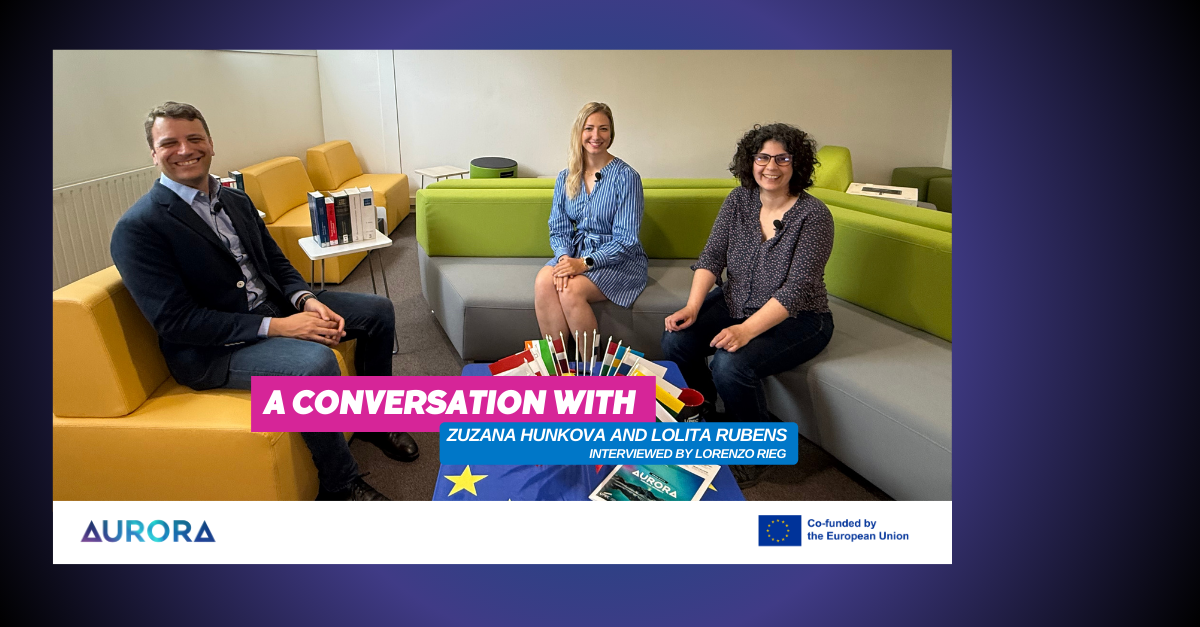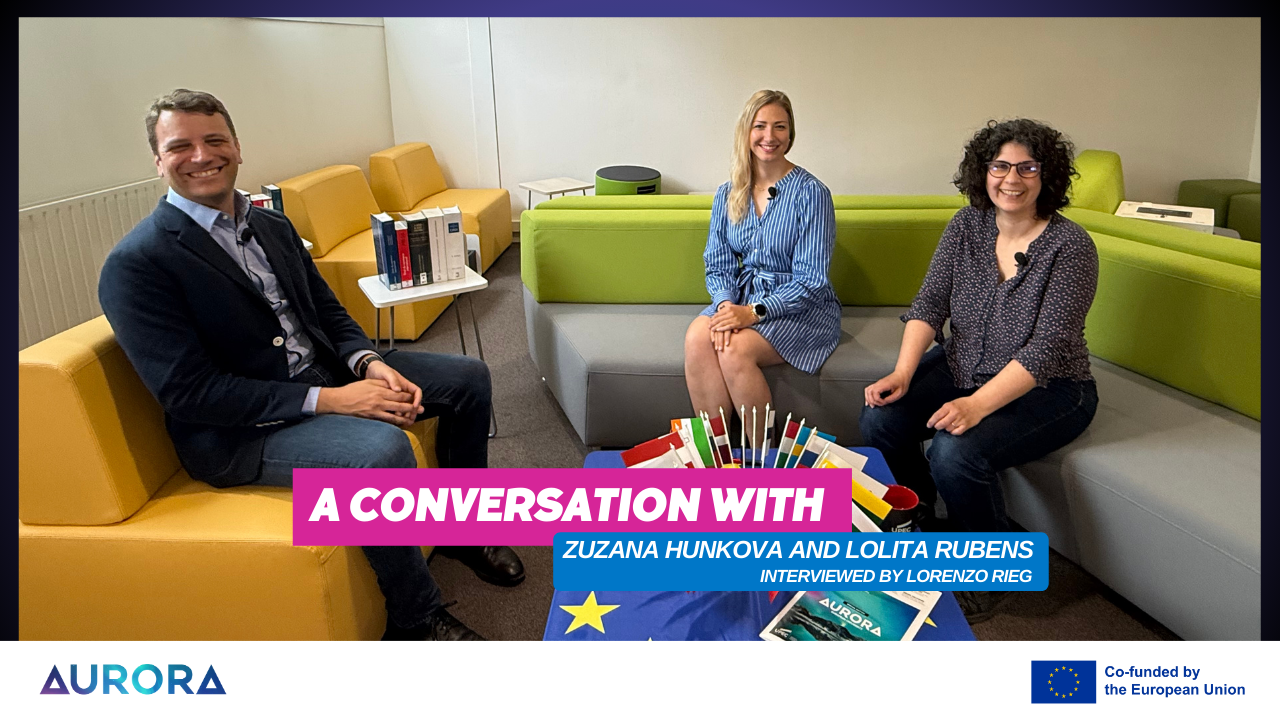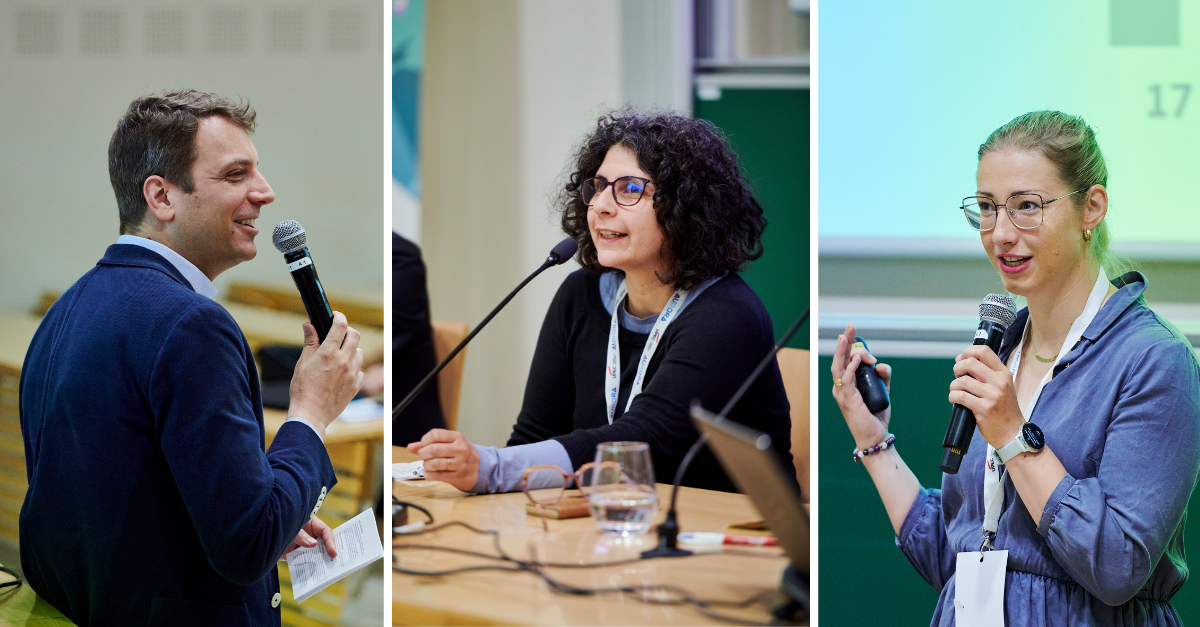A Conversation with Zuzana Hunkova & Lolita Rubens: Future of Sustainability & Social Responsibility

Sustainability and social responsibility are essential priorities for higher education institutions. In this insightful conversation, Lorenzo Rieg, Zuzana Hunkova and Lolita Rubens shared their perspectives on what sustainable and socially responsible campuses look like today, the challenges that must be addressed, and their expectations for the future.

This discussion was led by Lorenzo Rieg, Sustainability Coordinator at Universität Innsbruck and Lead for Aurora 2030 Task 6.2 Aurora Sustainable Campus. He interviewed Zuzana Hunkova, Coordinator for Sustainable Development at Palacký University Olomouc, and Lolita Rubens, Vice-president for Social Responsibility at Université Paris-Est Créteil (UPEC).
From Strategy to Impact: Institutional Approaches to Sustainability in Aurora
Lorenzo: Zuzana, maybe you can start by telling us a bit about yourself, how you ended up in your current role in sustainability development at your university, and also what you are doing within Aurora.
Zuzana: At the Palacký University Olomouc, I’ve been doing coordination for sustainable development for four years. I oversee the sustainable development strategy of the university, and ensure that I undertake all the actions connected with this. We have a team of four people working part-time on sustainability. Our strategy has 15 goals; we work on the basis of a two-year action plan that we follow very closely, and we change our goals every two years.
Lorenzo: Lolita, you’re Vice-president for Social Responsibility. I think it’s unusual to have this role at the Vice-president level of the university. Tell us a bit about what you do at UPEC, and also within Aurora.
Lolita: In France, we have a certification label for higher education institutions, called “Sustainability and Social Responsibility”. In UPEC especially, we have this project or objective to be a committed university, a civic university with social and societal impact. So, it was important for the President of UPEC to show that social responsibility is also central to our mandate. We also have a Sustainability and Social Responsibility team working here in UPEC, which I’m part of. Through our work in UPEC and in Aurora, we try to be inspired by all the measures taken to reduce carbon footprint, and attempt to include those elements in the plan that we voted for last year.
Social responsibility is about the impact that we can have on the regional territories, students and society. For instance, we work on equal opportunities where every student should have the same chances to succeed. Students that we have may face challenges, like they may work while studying, so they might not have as much time as other students to study properly. In this case, solutions could be some financial aid, or additional classes to help them succeed.
It’s also about the impact that we can have on employees and their well-being. Within research, this could be the social impact of research. UPEC being Lead in the Aurora 2030 Work Package on social impact of research, we’re working on another way of measuring the social impact that research can have. This is the same for teaching as well; trying to teach our students to become unique citizens and yet be part of the world, and society.
 From left to right: Lorenzo Rieg, Lolita Rubens and Zuzanna Hunkova speaking at the Aurora Sustainability Summit 2025
From left to right: Lorenzo Rieg, Lolita Rubens and Zuzanna Hunkova speaking at the Aurora Sustainability Summit 2025
Sustainability Challenges: From Awareness to Action
Lorenzo: Sustainability is now, I would say, very well established. A lot has been going on in the last ten years or even a bit more with individuals, but especially companies, also public institutions being very aware and paying much more attention to being more sustainable. We talk a lot about sustainability, but we still see that many things are not happening. What do you think are the reasons for that?
Zuzana: Sustainability has become such an important topic, and I think that’s the first thing that had to happen. We talked about it a lot, but it also very often just stops there. We talk about it, we prepare plans, strategies and goals. But what I very often see, especially in the Czech Republic, is that we’re missing the concrete actions to reach those goals. We have strategies for everything, but maybe we are now postponing to achieve them. That’s the core problem that we should press on further. Because we’re really losing time by just talking in the Czech Republic. We’re still sometimes coming back to the question if sustainability is important! I see this as a waste of time. We could already focus on what can we do without. So I would suggest maybe to take more actions, and less on preparing strategies and goals.
Lorenzo: It’s the case that people have a very good idea of what would be needed, but then for some reason it doesn’t happen. So do you think that’s because people are afraid of changes or because that it’s actually about money?
Zuzanna: I think that people in general are lazy, but in a good sense. First of all, it’s hard for us to change, and we don’t want to change so much because we are comfortable with our lives right now. In Europe especially, we have everything: we can go to the shops and buy anything we want, we can order whatever we want online, and we can have everything at home in 30 minutes. But we don’t realise the consequences of all this comfort: how much it costs not only in terms of money, but also in terms of the harmful emissions that we produce.
We need to change people’s behaviour, and that’s really hard to do. This is the hard goal. Changing behaviour doesn’t take one year; it takes decades, maybe even 100 years. Now, we’re already starting to realise. A basic example in the Czech Republic, where we’re really good in sorting waste, but it took us 20 years to get there. We needed time to realise that we shouldn’t waste water. I think we’re doing good, but I’m just afraid we’re not as fast as we should be right now.
Lorenzo: Lolita, your work with communities is a nice way to bring action to maybe not the whole world, but to your area, to your group of people, which you might be able to influence. Can you comment on this?
Lolita: I agree that it’s difficult to change for individuals, but I think one of the obstacles that we have is that the issues are so complex that it’s not only one element that we have to change. We have to consider this question about partnerships and other actors. Many things don’t depend only on the university. We have to speak with communities, cities and partners outside of the university. Of course, working all together could be difficult and could take a long time, especially in big public institutions, where we can have difficulty to go forward quickly.
For example, we have a project to encourage people to take public transportation, or use their bicycles. We can help them by ensuring that their bicycles are safely parked in the university. But the problem is that, this project will not work if they’re not allowed to ride their bicycles around the university. So, for this to work, we’ll have to speak with the cities, especially Creteil or the surrounding cities to make sure that these cities allow bicycles to circulate safely. We must ensure that it’s not only what we do in the university, but also outside, like we can be in touch with associations that help repair bicycles, for instance. But we have to think about all the actions, and speak with many people, to try to coordinate ourselves. This is where the difficulty lies sometimes.
Educating for a Sustainable Future: The Role of Universities
Lorenzo: That’s a nice way of leading to my next question about what universities should do, or focus on, not just as individual universities, but in the Aurora network as well. As you said, we cannot influence everything. I think universities also educate students, and do research. There’s a lot we can contribute to the discussion, in actually setting certain goals, and pursuing certain actions. What do you think about what universities should do to be more sustainable, and bring that into the communities and into the world, so to say?
Zuzanna: Universities, first of all, should focus on what their core is, which is educating right. I think education and sustainability are really the basic foundations. I’ve been working in this topic for five years, and the most important thing I see is, when we have young people educated and we try to involve them in all subjects because, often it happens to me that when I talk with people in the faculty of medicine, they tell me “Sustainability is not our topic”. I respond with: “That’s not true. Sustainability is everywhere”. We should also try to involve sustainability topics in teaching, in every subject we have. For example, I think it would be great if we could have a base education in sustainability for all faculties, for all university students, such as a core course over a semester.
Secondly, I believe that universities in general work as a good example for a society. So we should be leading in the sustainability topic, to show companies, political parties, and organisations how we should approach sustainability goals.
Lorenzo: Lolita, would you like to add your perspective?
Lolita: Teaching is important. In France, starting next year, every student in their first year will have a mandatory module on those topics. This is the idea of trying to teach everyone and not only those with a specialty in sustainability. It’s really important because many careers will appear in the next year, so we’re educating, teaching people who will have a professional life where they will have to maybe change their career, and adapt their jobs to the situation. They have to be aware of these topics. I think we should also be able to show the research and knowledge that we have in the university, to disseminate and speak about these topics.
Finally, in France especially, we have to spend public money well. We try to be an example as a university and to think about every aspect of our spending. To have an impact, we have to choose the people we work with, and choose who we give our money to. So, this has to be reflected upon as well and really thought about.
Lorenzo: Teaching or reaching students and keeping students with the skills relevant for the future, relevant for sustainability, and making it more accessible or bringing more into society are really important, not only to inform people, but maybe also to help companies and other institutions. Where we spend money or how we run operations is something universities actually often struggle with. It’s partly because of monetary or other constraints. It can be that we can change things and it doesn’t cost us much, but it can also be very expensive.
In my view, sustainability is now well-known. We already talked about that, but it’s not so strongly embedded in our daily life or also in the structures of public institutions like universities, where we will go in the years ahead. What do you think will happen in the future with sustainability at universities?
Lolita: It could be difficult to know what will happen because we know some other aspects, and especially political aspects, or aspects outside of the university, may have an impact. Either the situation is worse and maybe people will have to consider those elements more clearly because we will see the consequences more and more. So we have to change, but maybe not in the right way: it will be something that we’re not committed to, but that we will have to do. It’s not good when we have to change when it’s something that is mandatory.
Or we could be optimistic as well. I think that the students that we have are quite committed to the situation. In France especially, they speak about sustainability from primary school. So it has been a long time, and they can be quite bored with the subject or find that it’s not something joyful. We have to help them see something joyful, and maybe change the stories we tell, the things that we present, and the way we present them. With this module that I spoke about earlier, we try to make students act by trying to do things on their campuses, trying to make them change things, and see the results and consequences of what they are doing. This is something that we need to continue and involve everyone in these changes, and not limit it only to the people deciding for universities. With the deliberative assemblies that we have in UPEC and in Aurora, I see more people involved and more people working for the communities, for the society and for the universities.
Lorenzo: Zuzanna, how do you see sustainability developing?
Zuzana: I agree with Lolita that there are always two scenarios. In the years I’ve been in sustainability, I’m starting to worry because, with the latest changes in the European Union and among world leaders, we see that sustainability has become very important, and yet, I’m afraid it’s falling behind a little bit. Being a life optimist, I still believe we will take the the right path.
Research says that students are the next generation. The current students or even younger kids are very into sustainability. For them, it’s natural. They have been educated about this since elementary school, and they don’t consider it as something new. They consider it ingrained into themselves. For them it’s a core part of their values. They no longer choose their university according to the best rankings, but also how sustainable the university is.

Aurora universities come together during the Aurora Annual Conference and Sustainability Summit.
From left to right: Ramon Rispoli and Benedetta Toledo from Università Federico II of Naples, Zuzanna Hunkova from Palacky University Olomouc, Marjolein Zweekhorst from Vrije Universiteit Amsterdam, and Lorenzo Rieg from Universität Innsbruck.
Aurora as an Enabler of Sustainable Partnerships and Community Networks
Lorenzo: It’s also my experience that students are actually so much further in how they see sustainability, how they also act more than most older people. Before we wrap up this conversation, I would like to give you the opportunity to say something which I didn’t ask or which you want to bring in as your final statement.
Lolita: To go back to Aurora, I think that what is very good is to be able to speak with other universities and feel reassured that we have the same challenges. We find support, and also exchange best practises to be inspired with and by other universities. We also have more strength together to implement things that we don’t yet have, but know how it was implemented in other universities. So it is very good to see other universities with the same values that are really connected to those of sustainability, equality or fight against inequality.
Zuzana: I would say that it was really important for engaging the sustainability topic in my university. Partnerships are good examples, as we learn a lot from our partner universities. It also gives us the strength when we argue for sustainability at the university and we can show best practices from, say, UPEC, on the actions already taken and the way they have managed it. This helps me in my job.
We also have a partnership through the Czech universities. Four years ago when I started, we were maybe two or three universities out of 26 that were doing something for sustainability. But now, we have managed to bring together all 26 universities to work on a sustainability strategy. So you can see how partnerships and the community of the universities can really help push the topic forward.
Lorenzo: I can only agree that this exchange is quite important. It’s essential to highlight successes, and through best practises, underline good examples for other universities within the Aurora network and beyond.
This conversation is part of a series called “A Conversation With…” undertaken within the framework of the Aurora 2030 programme supported by the European Commission. It is an interview format that focuses on a specific topic and is meant to inspire its readers to reflect on and catalyse positive impact. The exchange is available in its original format on the Aurora YouTube channel.